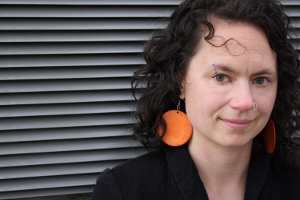
Lines for “Obit [The Doctors]”
Contributor’s Marginalia: Emily van Kley on a poem by Victoria Chang
In this poem’s distance its intimacy increases, the way grief prevents some from uttering a loved one’s name.
A poem, alone on a page in front of an unknown reader, is achingly public.
A poem about death, written in a quiet room, read by a stranger with only a napping dog for company, is one of the most intimate things.
Why, in the first lines of this poem, are we told the doctors have died? The doctors haven’t died. But someone important to the speaker has—perhaps the father, who in another poem in this series suffers a stroke. The doctors’ job was to make the important person well, but instead the doctors disappear, without proper ceremony or emotion: “their/ eyes that should have been red/ but weren’t.”
What does it mean to give a death away? Some things must be spoken askance. When someone we love dies, there is a multiplication of absence: furniture, doctors, text messages, turns of phrase. A chaos of significance. Overwhelmed by loss, we may refer to parallel thefts, which hurt less.
A poem has a speaker, though in this poem mostly no one claims to be speaking. The infinitive is taken as subject. “We” arrives five lines from the end.
Death reminds us that a self can be erased.
We try to match death’s import, but aren’t qualified. Everything we wish––to quickly end suffering, to extend life amidst suffering, to indulge in the sensuousness of daily necessity (“pots of jam/ butter glistening”) while someone is suffering––proves the vastness of what we miss.
In death the unknowable gains a body (a father, a child, a lover, a friend). Of the familiar it creates strangeness. We come close enough to hold death (in the self it borrows), but its secrets remain untethered, impossible to grasp.
“Do/ we want the orchid or the swan/ swimming in the middle of the/ lake?…The orchid/ is our understanding of death./ But the swan is death.”
